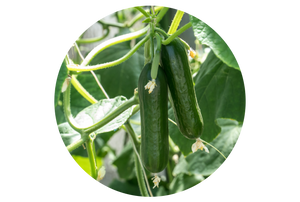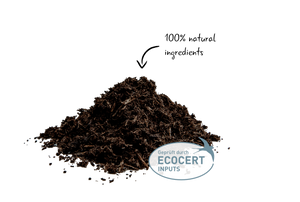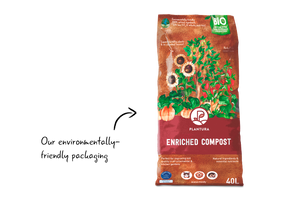Organic Enriched Compost, 40L
- Regular price
- Sale price
- Regular price
- Sale price
- In Set
- Single
Incl. VAT; free shipping on orders over £39
Frequently bought together
Organic Tomato & Vegetable Compost, 40L
Rated 5.0 out of 5 stars
4
- Regular price
- £16.99
Starting at
Currently unavailable
Incl. VAT; free shipping on orders over £39
-23%
Tomato Food, 1.5kg
Rated 5.0 out of 5 stars
1
- Sale price
- £9.99
- Regular price
Starting at
£12.99
Incl. VAT; free shipping on orders over £39
-18%
Liquid Tomato Food, 800ml
Rated 5.0 out of 5 stars
1
- Sale price
- £8.99
- Regular price
Starting at
£10.99
Incl. VAT; free shipping on orders over £39
-20%
Lawn Feed 10.5kg, 250m2 coverage
Rated 5.0 out of 5 stars
4
- Sale price
- £23.99
- Regular price
Starting at
£29.99
Incl. VAT; free shipping on orders over £39

What are the benefits of using enriched compost?
Our enriched compost has a high humus content, which fosters a healthy and active soil life and keeps the soil fertile for a long time. It also significantly improves the soil’s water and heat balance, resulting in an abundant harvest and splendid blooms. Our peat-free enriched compost also contains 60% compost, ensuring healthy root growth and strong plants.

What is Plantura Enriched Compost made of?
Our organic compost is completely peat-free and consists of 100% natural raw materials. As a result, it produces up to 30% less CO2 during production than conventional composts that contain peat. Our growing medium consists of 60% compost and is pre-fertilised, providing optimal conditions for heavy feeders to thrive.

What is the packaging made of?
All of our composts come in Blue Angel (German eco-label) certified packaging made of 80% environmentally-friendly recycled plastic known as recyclate. At Plantura, we believe that plastic is an extremely valuable raw material that should be recycled whenever possible. We thus ask that you put the empty bags in your recycling bin or take them to your local plastic recycling centre or collection facility.
Why Plantura
We are a growing company based in Munich committed to bringing you effective and sustainable products. We stand for:













